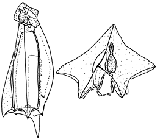RAS taxon details
Abylidae L. Agassiz, 1862
135336 (urn:lsid:marinespecies.org:taxname:135336)
accepted
Family
- Subfamily Abylopsinae Totton, 1954
- Genus Bassia L. Agassiz, 1862
marine, brackish, fresh, terrestrial
recent only
Agassiz, L. (1862). Contributions to the natural history of the United States of America. <em>Little Brown, Boston.</em> 4: 1-380, pls 1-19., available online at https://www.biodiversitylibrary.org/page/16068829
page(s): 372 [details]
page(s): 372 [details]
Schuchert, P.; Choong, H.; Galea, H.; Hoeksema, B.; Lindsay, D.; Manko, M.; Pica, D. (2025). World Hydrozoa Database. Abylidae L. Agassiz, 1862. Accessed through: RAS (Eds.) (2025) Register of Antarctic Species at: https://ras.biodiversity.aq/aphia.php/aphia.php?p=taxdetails&id=135336 on 2025-09-13
RAS (Eds.) (2025). Register of Antarctic Species. Abylidae L. Agassiz, 1862. Accessed at: https://ras.biodiversity.aq/aphia.php?p=taxdetails&id=135336 on 2025-09-13
Date
action
by
original description
Agassiz, L. (1862). Contributions to the natural history of the United States of America. <em>Little Brown, Boston.</em> 4: 1-380, pls 1-19., available online at https://www.biodiversitylibrary.org/page/16068829
page(s): 372 [details]
context source (Hexacorallia) Fautin, Daphne G. (2013). Hexacorallians of the World. (look up in IMIS) [details]
additional source Totton, A. K. 1965. A Synopsis of the Siphonophora. London, British Museum (Natural History). Pp. 230. [details]
redescription Sears, M. (1953). Notes on siphonophores. 2. A revision of the Abylinae. <em>Bulletin of the Museum of comparative Zoölogy of Harvard College.</em> 109: 1-119., available online at https://www.biodiversitylibrary.org/page/3886008 [details]
page(s): 372 [details]
context source (Hexacorallia) Fautin, Daphne G. (2013). Hexacorallians of the World. (look up in IMIS) [details]
additional source Totton, A. K. 1965. A Synopsis of the Siphonophora. London, British Museum (Natural History). Pp. 230. [details]
redescription Sears, M. (1953). Notes on siphonophores. 2. A revision of the Abylinae. <em>Bulletin of the Museum of comparative Zoölogy of Harvard College.</em> 109: 1-119., available online at https://www.biodiversitylibrary.org/page/3886008 [details]
 Present
Present  Inaccurate
Inaccurate  Introduced: alien
Introduced: alien  Containing type locality
Containing type locality
